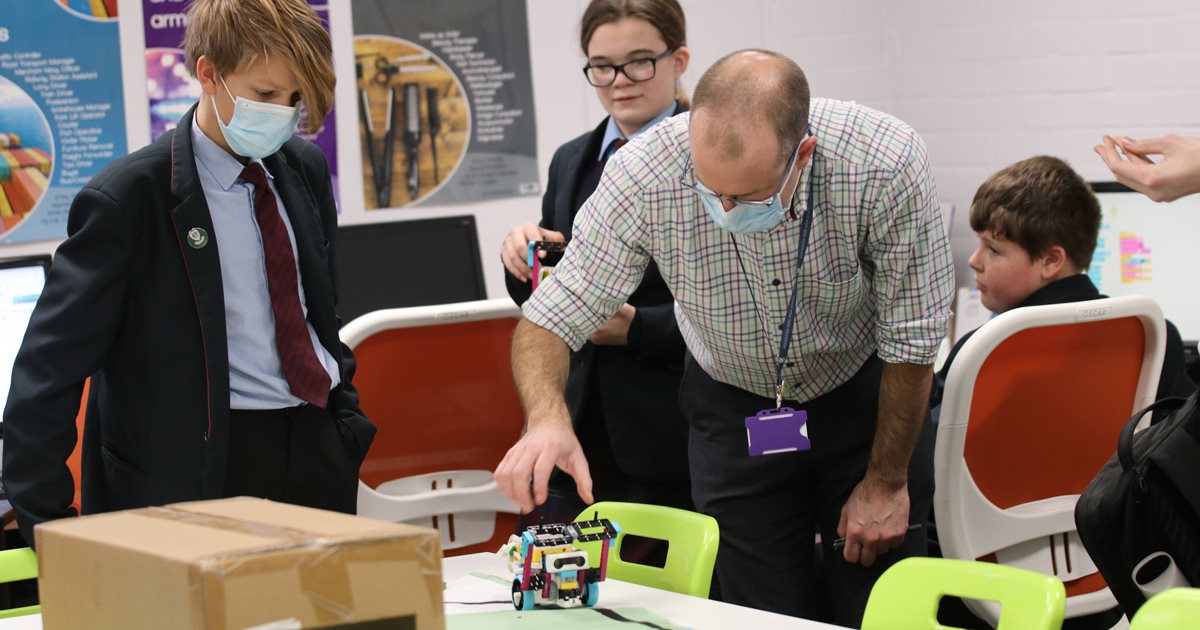Collaboration for greater impact - Coding Success
Coding Success, a programme that aims to help teachers boost their students’ coding and robotics skills, shows just how collaboration can lead to high impact engagement with teachers and young people.
Collaboration for greater impact is at the heart of The Tomorrow’s Engineers Code and Code Connect, because no organisation can successfully address the skills challenge alone. Working together, with a willingness to share insight and leverage respective strengths, can result in outreach activities and programmes that have a real impact.
Coding Success, a programme that aims to help teachers boost their students’ coding and robotics skills, shows just how collaboration can lead to high impact engagement with teachers and young people.
Code Signatories The Smallpeice Trust alongside Raising Robots were commissioned by BAE Systems and Signatories the Royal Navy and the Royal Air Force to develop the programme, which supports delivery across the 4 pledges of The Code.
Inspiring Connection
The Code Community can support the inspiring connection pledge by working with fellow Signatories to develop a sustained package of engagement activities for young people.
The Coding Success programme was a quick turnaround co-creation designed to continue to support schools while most face-to-face events, including the BAE Systems Schools Roadshow, were cancelled due to Covid-19.
With schools outreach on hold, BAE Systems, the Royal Navy and the RAF approached The Smallpeice Trust to develop an alternative programme for in-school delivery. Working with Raising Robots, who brought their content design expertise to the table, the team developed a fully-funded programme that engaged nearly 600 schools across the UK and reaching 36,800 students. The programme saw partners working together, drawing on different sets of expertise to achieve the best possible outcomes.
Making sure others know what you’re doing is another element of the pledge and one way Coding Success did this was by featuring the activity on Neon. The team also looked for ways to expand the offer to school, creating a tailored lesson to support schools in the programme to take part in the FIRST® LEGO® League Challenge, delivered by the Institution of Engineering and Technology (IET). That tie in with the IET saw them supply free LEGO® expansion kits to 54 schools, giving them what they needed to participate
“It’s great to see collaborations like these – with Coding Success working in partnership with the IET and FIRST® LEGO® League Challenge, to create a more sustained STEM journey for young people with the aim of increasing the impact of individual inspirational STEM programmes.”
Dr Hilary Leevers, Chief Executive, EngineeringUK
Driving inclusion
This pledge aims to ensure no one is left behind and all young people have opportunities to engage in engineering inspiration activities. Signatories are encouraged to prioritise the funding, creation, and delivery of activities to groups underrepresented in engineering.
Coding Success aimed to reach the students most likely to need support, as well as those from those underrepresented groups. Schools were selected against a set of criteria, including the proportion of students eligible for free school meals, socio-economic data of the local area, and diversity of ethnicities within the student population. The programme had a wide geographical spread and was available to both primary and secondary state schools.
The content and messaging were designed to show that engineering is for everyone whatever their gender or background, using inclusive messaging and relatable role models – the partners highlighted female success stories within their own staff, with interviews and profiles embedded in the programme resources.
“FIRST® LEGO® League gives students hands-on experience with robotics and designing innovative solutions to real world problems. We hope experiencing engineering in action will inspire young people into an engineering career. We value the connection with Coding Success, which means even more future engineers can take part in FIRST® LEGO® League through the IET.”
Lucy Owen, IET FIRST® LEGO® League Education Manager
Showcasing engineering
Promoting a positive, compelling, and authentic view of engineering and showcasing the breadth of opportunities help make it a career young people can identify with.
Role models can have a significant impact on their perceptions of engineering as a possible career option and Coding Success championed diverse case study role models, working out from the premise that ‘you have to see it to be it’.
The central activity is a virtual humanitarian mission that sees students coding their robots as part of an imagined earthquake response, including rescuing the injured and securing a supply of fresh water. The range of applications of the coding and robots highlights the different sectors and scenarios that programmers work in, challenging stereotypes and broadening horizons.
Because the programme is delivered in schools by teachers, Coding Success not only showcases modern engineering to students but, through teacher training, also has the opportunity to give teachers an insight into what real engineers work on.
“Working with the Royal Navy and the Royal Air Force to support the co-creation Coding Success programme, we aim to give student and teachers the practical hands-on experience they need and inspire the next generation of STEM professionals.”
Richard Hamer, Education and Skills Director at BAE Systems
Improving impact
Understanding the impact of your outreach activity is essential, both in terms of programme development and our collective understanding of what works well. Developing a shared understanding of what works helps drive continuous improvement and increase investment in activities with proven, evidence-based impact.
Coding Success implemented monitoring and evaluation at different points of the programme. For example, teacher evaluation covered the CPD stage as well as the in-school programme delivery.
Student evaluation looked at which STEM subjects they enjoyed, how they developed knowledge and confidence, and which key skills they improved (guided by the Skills Builder Universal Framework), as well as gauging interest in a STEM career as a result of taking part.
